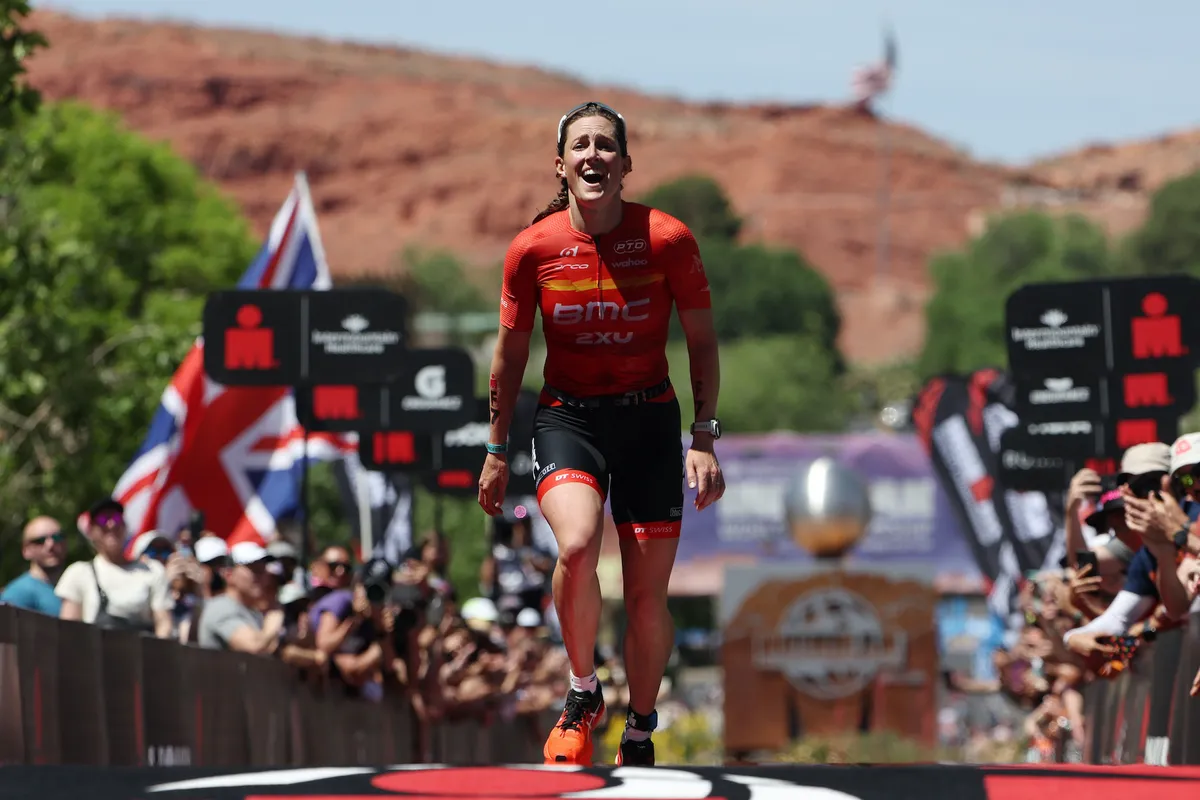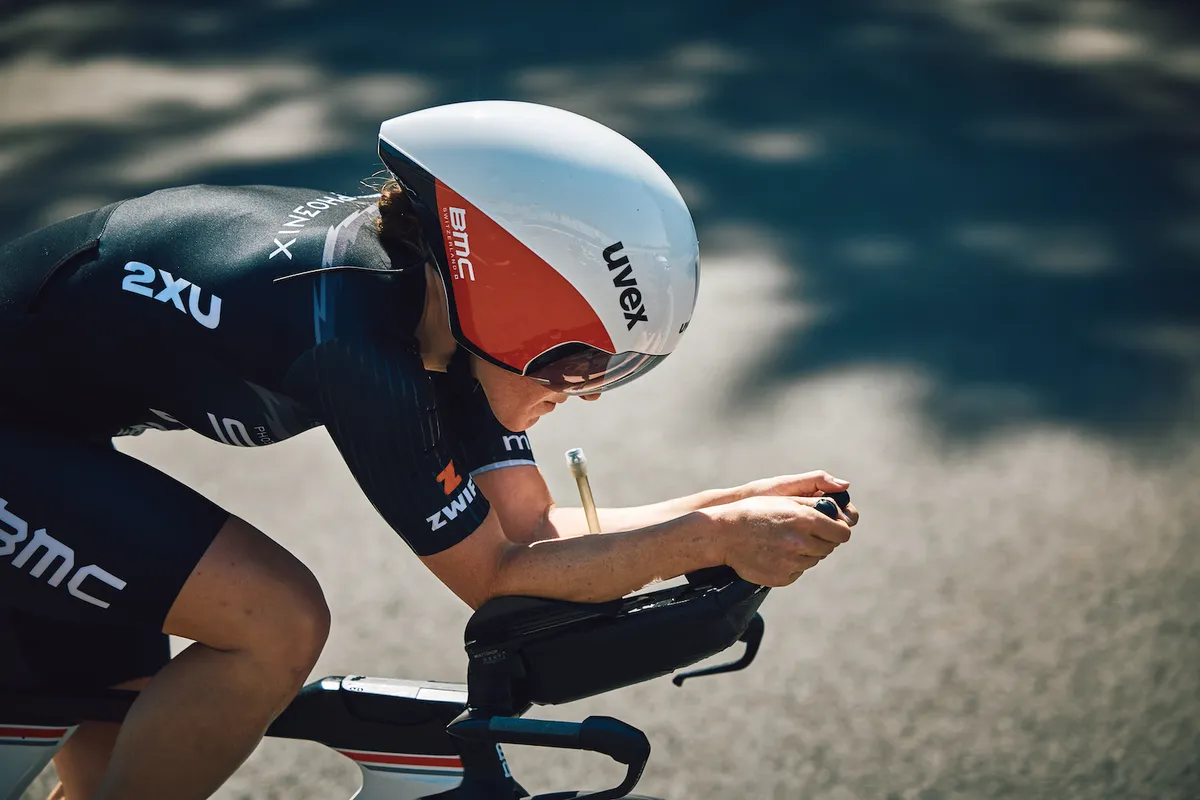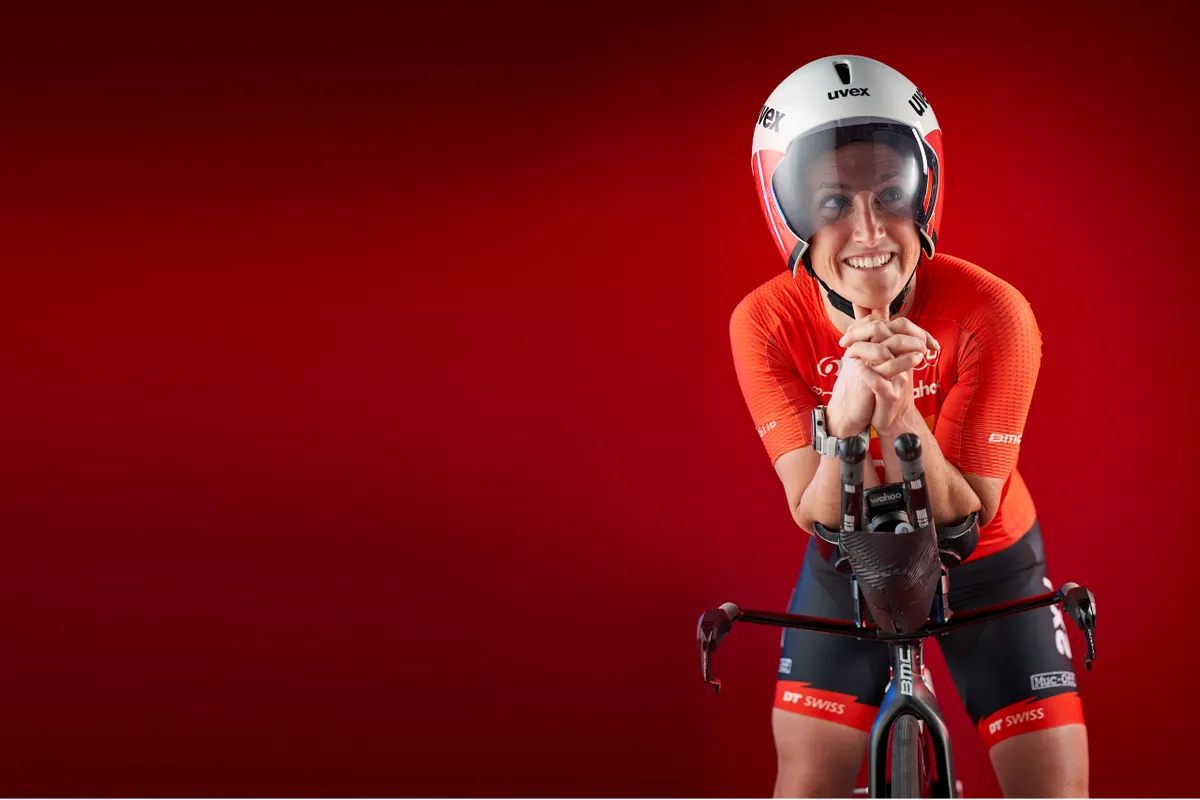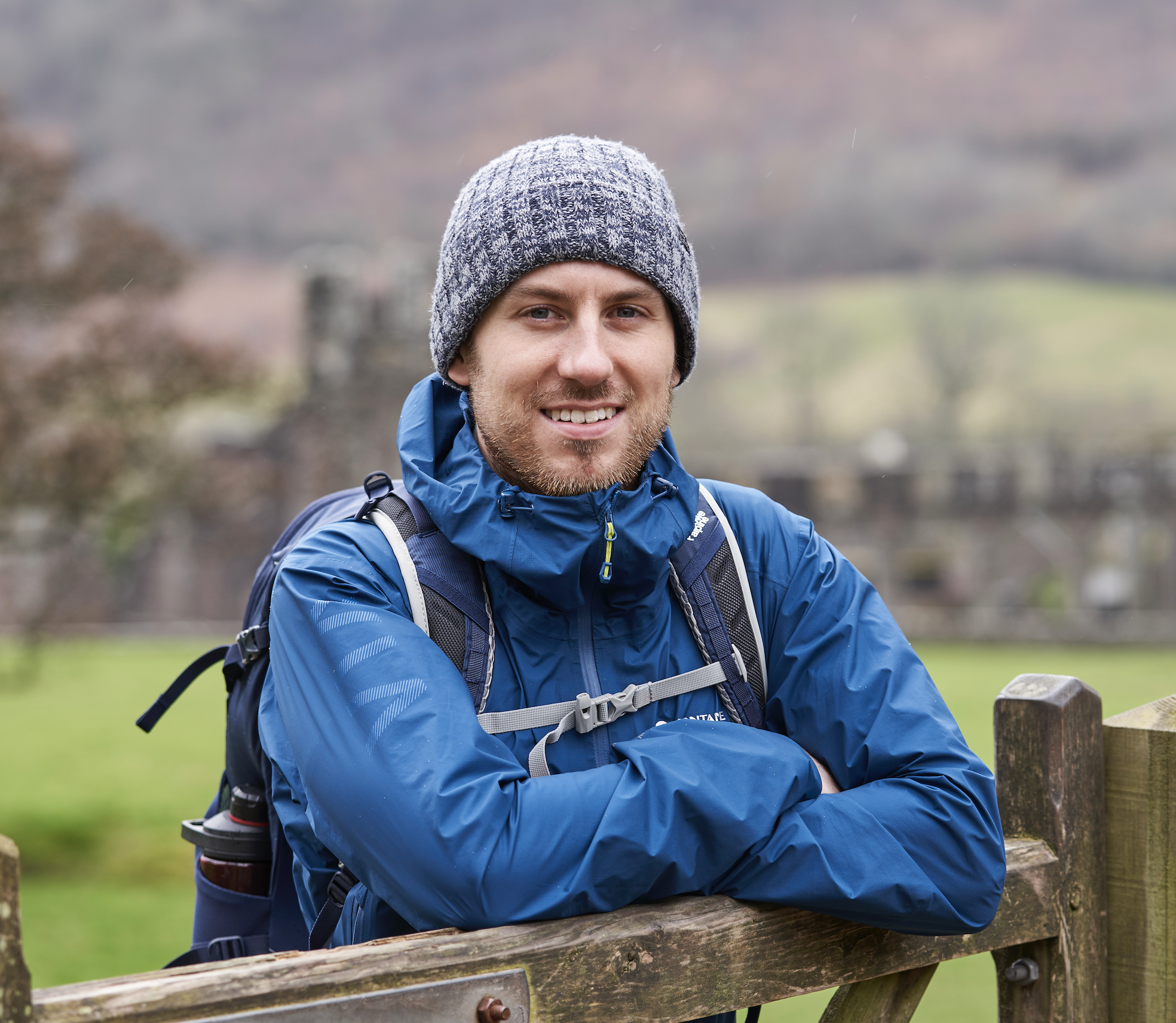It’s 10.58am on 21 June and 220 is expecting a very special visitor. Just two weeks on from a remarkable performance at the Sub8 in Germany, British pro Kat Matthews is visiting us in Bristol for a chat and photoshoot.
Forgive the pun, but the cat is now well and truly out of the bag. Any reservations about Kat’s ability to compete at the very pinnacle of long-distance racing have long been erased thanks to her performances at both the Ironman Worlds in May and the Sub8 in June. In her first full-distance worlds, Matthews placed runner-up to five-time champion Daniela Ryf.
Four weeks later she smashed the elusive 8hr women’s long-distance barrier in a time of 7:31:54 at the invite-only Sub8 project, having taken the place of an injured Lucy Charles-Barclay.
The phone rings. It’s Kat, letting us know she’s arrived. She’s right on time, but that’s not surprising given her background as a physiotherapist officer in the Army. We help bring in her kit, including a weighty Sub8 trophy. Though by her own admission a photoshoot is far from her comfort zone, she seems relaxed, unassuming and open to the many ideas we have for the forthcoming shoot – after a chat about coffee, of course.
Having only taken up tri in 2015 before turning pro in 2019, Matthews hasn’t been in the sport long. And it’s even less time when you consider the two pandemic-interrupting seasons since her step up. Not that this hampered her results, the 31-year-old starting 2022 with two full and three half-Ironman wins to her name.
By the time the Sub8 project rolled around, Matthews had joined the growing number of voices tipping her for success: “I know I can go sub-eight,” she told us in April. She wasn’t wrong, smashing it by almost half an hour.
Of course it’s not all been as easy as it sounds, and over a very pleasant few hours Matthews opened up on the battles she faced in both of those huge events, the importance of balance and what comes next…
220: Talk us through the highs and lows of that fantastic result at the Ironman worlds...

I got a little bit ill and picked up a running injury in the build-up, so preparation wasn’t ideal, but mentally I was in a really good place to just see what I had. During the race, the swim went really well. It was the best experience I’ve had [in an Ironman swim].
I think riding with Daniela for the first 60 or 70km was a big confidence boost because I knew that I was riding over my target in terms of what I thought my capacity was, but I felt okay. Then I made a sensible decision to not continue to push that pace, so I let Daniela go. And then she just crept away.
I actually struggled quite a lot in the second half of the bike mentally. It wasn’t how I wanted to race the bike at all. I was really gutted. My legs were more sore than they’d ever been getting off the bike. I wasn’t even sure if I was going be able to, like, dismount properly.
Normally when I get on the run everything’s fine and I feel really good and happy. This was a complete opposite. My legs were so heavy, everything hurt and I did the entire run basically just whinging to myself about how horrid it was.
220: How did you pick yourself up to get through the final marathon?
I don’t know if I picked myself up. That pace was quite slow, really. I just kept breaking it up into four lots of 5km uphill. That was all I was thinking about. I was in a whole world of hurt and I think it was like a dark hole of grumpiness and thinking ‘just get to the finish’.
There was lots of positive self-talk. That, and support from spectators, was probably what got me through.
220: Where do you get your resilience from, do you think? Was it the Army training?
I guess there’s a cliché answer of life experience, but I don’t think I’m doing anything deliberate or special. I’m pretty invested in the psychology that you have these emotions throughout life, not just in sport, and the way you process them and your rational decision making is then up to you. It’s your choice.
I guess in the past, when I was a teenager, I used to work at Tesco on the checkouts and I feel like 12hr shifts on checkouts are probably just as traumatic as my army training! So maybe one or both of those had some mental training in there.
220: How did you feel in the hours and days after the race?
Really just happy. It didn’t feel like I’d lost, it felt like I’d won, even though I came second. I know for some people it’s only about winning, but for me it was more about the performance.
220: How much did the result in St. George
[IM Worlds]
influence your approach to Sub8?
Massively. Maybe it shouldn’t have, but it took all the pressure off because I knew that I was in the best shape to do it.
220: The swim seemed to go well. Did the bike go to plan?

The bike went well, but I don’t think we got our tactics right. In hindsight, the static wheel of Ruth [Astle] probably wasn’t enough draft for me. The girls rotating in the front were so powerful and we had such a small team, so there were lots of rotations, which meant at the back it was really quite surgy.
My heart rate on the bike was identical to St. George, so the intensity was still there, it was just an hour less time, which was not what I expected at all.
I was mentally destroyed. It just felt like four hours of constant concentration and surging. Normally the bike is quite fun. You can look around, ride the road. This was just horrendously boring, no fun whatsoever and just stressful.
I still had a run PB (2:46), but it was nowhere near as fresh as I’d hoped.
220: What went through your mind when Nicola
[Spirig]
passed you on the run?
I knew after the first two kilometres that she was running faster than me, so I’d sort of been dealing with it for the last 30km. That was fine. In my head, it was like if she can run a 2:40 – I think she was even on for a 2:35, she went out so hard – fair play. I can’t.
I just stuck to what I can do. I didn’t do anything special. She came past, I just kept running the same and then she just blew up and I just went past. I didn’t put in a huge surge or anything like that.
220: How did you celebrate?
They had a VIP lounge, which hosted everybody after the event, like at the finish line. It was just flowing with food and alcohol. It was basically just a massive party.
220: So you don't avoid any foods or alcohol after racing for recovery?
No, I don’t really think there is such a thing as ‘cheat’ food, personally. I think I eat a normal diet all the time. I think there’s real importance for your mental health to take time out.
And for me, I enjoy having a drink with friends, so if I stopped myself doing that, I don’t think I’d be as happy for the whole year and therefore I don’t think I’d perform as well. It’s obviously not a performance gain, but I think over the year, having a more balanced lifestyle helps me.
220: What did you learn from Sub8 that you can apply to future races?

That I can go out harder [on the run] and still finish just as strong. I think that’s quite exciting because it basically gives me a few minutes of extra speed and confidence.
If it had been a really easy bike and I had run that well, I’d have had that caveat of it being because the bike was really easy. Whereas I feel like because the bike intensity was still just as hard, it meant that I can actually use that run performance as a marker. I can try and do that in Kona.
220: People often talk about your run volume being low. What's your take on that?
In an ideal world, I reckon I’d aim for 50km a week. There’s been periods of training where I’ve achieved that for maybe a couple of months, but what I won’t do is if I feel like there’s any risk or if something’s not quite right, I won’t just keep running and therefore get an injury. I’ll just reduce the run volume. I think therefore I can still race and perform off really low run volume.
I do think that your cycling can really only substantially improve if you’re not also thrashing your legs on the run. So I think a lot of people are really guilty, especially if you’re time restricted, of just going for a run because it’s easier. And actually, I think you might get the same fitness benefit from cycling, but you’re also going to get better at cycling! Whereas if you just run, you’re going to only get better at running, maybe worse at cycling, and you’re more at risk of injury.
220: What advice would you give your younger self?
- Spend time learning about your body. Specifically heart rate and training zones.
- Have the discipline to do the training or know when it’s right to not do the training.
- Sleep enough. Aim for eight hours as a block.
- Focus on the basics. There’s no point training perfectly if you’re then not hydrating, eating and recovering perfectly. So at least prioritise those to the same extent.
- Focus on performance data rather than how you look.
220: What are your aims for the rest of the year and beyond?
I’m probably going to race Collins Cup, PTO Dallas and then the main focus is still on Hawaii. If I’m healthy after Hawaii, I’d quite like to go to [Ironman] Cozumel and actually try and go sub-8hrs there. With the right conditions I think it’s possible. But that’s just like a side note. Hawaii is the focus.
Quickfire questions
First meal after Sub8?
A bratwurst sausage.
Amount of alcohol consumed at the afterparty?
More than enough.
Favourite music to listen to while training?
It's a playlist. Frodissimo Friday. I don't know if he [Jan Frodeno] made it, but it's really quite good. #FrodissimoFriday on Spotify.
Favourite part of training?
Fast run sessions.
Least favourite?
Threshold swims.
Pet peeve?
Too many! Open roads in a race.
Go-to way to switch off and relax?
Going to the pub.
Prediction for Kona?
A win for me. Daniela Ryf and Laura Philipp on the podium.
Best advice you've ever been given?
You do you.
Favourite type of course?
Challenging, but with a flat run.
Top image credit: Dave Caudery
